Related Research Articles
An integrated development environment (IDE) is a software application that provides comprehensive facilities to computer programmers for software development. An IDE normally consists of at least a source code editor, build automation tools, and a debugger. Some IDEs, such as NetBeans and Eclipse, contain the necessary compiler, interpreter, or both; others, such as SharpDevelop and Lazarus, do not.

Lego Mindstorms is a hardware and software structure which develops programmable robots based on Lego building blocks. Each version includes computer Lego bricks, a set of modular sensors and motors, and parts from the Lego Technic line to create the mechanical systems. The system is controlled by the Lego bricks.
leJOS is a firmware replacement for Lego Mindstorms programmable bricks. Different variants of the software support the original Robotics Invention System, the NXT, and the EV3. It includes a Java virtual machine, which allows Lego Mindstorms robots to be programmed in the Java programming language. It also includes 'iCommand.jar' which allows you to communicate via bluetooth with the original firmware of the Mindstorm. It is often used for teaching Java to first-year computer science students. The leJOS-based robot Jitter flew around on the International Space Station in December 2001.

Macintosh Programmer's Workshop (MPW) is a software development environment for the Classic Mac OS operating system, written by Apple Computer. For Macintosh developers, it was one of the primary tools for building applications for System 7.x and Mac OS 8.x and 9.x. Initially MPW was available for purchase as part of Apple's professional developers program, but Apple made it a free download after it was superseded by CodeWarrior. On Mac OS X it was replaced by the Project Builder IDE, which eventually became Xcode.
brickOS is an open-source operating system created by Markus Noga as firmware to operate as an alternative software environment for the Lego Mindstorms Robotic Invention System [14]. brickOS is the first open-source software made for Lego Mindstorms robots. It is embedded with a C/C++-based and a Java-based environment for RCX program through utilizing g++ and jack toolchain. It uses a Hitachi H8 cross compiler assembler as its primary toolchain.

Google Web Toolkit, or GWT Web Toolkit, is an open-source set of tools that allows web developers to create and maintain JavaScript front-end applications in Java. It is licensed under Apache License 2.0.
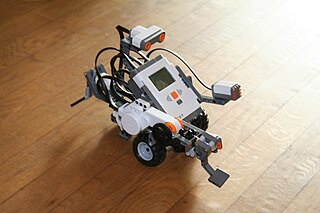
Lego Mindstorms NXT is a programmable robotics kit released by Lego on August 2, 2006. It replaced the first-generation Lego Mindstorms kit, which was called the Robotics Invention System. The base kit ships in two versions: the Retail Version and the Education Base Set. It comes with the NXT-G programming software, or optionally LabVIEW for Lego Mindstorms. A variety of unofficial languages exist, such as NXC, NBC, leJOS NXJ, and RobotC. The second generation of the set, the Lego Mindstorms NXT 2.0, was released on August 1, 2009, featuring a color sensor and other upgraded capabilities. The third generation, the EV3, was released in September 2013.
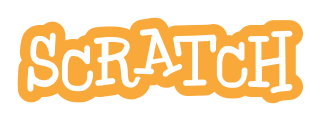
Scratch is a high-level block-based visual programming language and website aimed primarily at children as an educational tool for programming, with a target audience of ages 8 to 16. Users on the site, called Scratchers, can create projects on the website using a block-like interface. Projects can be exported to standalone HTML5, Android apps, Bundle (macOS) and EXE files using external tools. The service is developed by the MIT Media Lab, has been translated into 70+ languages, and is used in most parts of the world. Scratch is taught and used in after-school centers, schools, and colleges, as well as other public knowledge institutions. As of 15 February, 2023, community statistics on the language's official website show more than 123 million projects shared by over 103 million users, over 804 million total projects ever created, and more than 95 million monthly website visits.
Urbi is an open-source cross-platform software computing platform written in C++ used to develop applications for robotics and complex systems. Urbi is based on the UObject distributed C++ component architecture. It also includes the urbiscript orchestration language which is a parallel and event-driven script language. UObject components can be plugged into urbiscript and appear as native objects that can be scripted to specify their interactions and data exchanges. UObjects can be linked to the urbiscript interpreter, or executed as autonomous processes in "remote" mode.
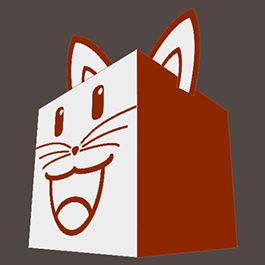
LOLCODE is an esoteric programming language inspired by lolspeak, the language expressed in examples of the lolcat Internet meme. The language was created in 2007 by Adam Lindsay, a researcher at the Computing Department of Lancaster University.
Not eXactly C, or NXC, is a high-level programming language for the Lego Mindstorms NXT designed by John Hansen in 2006. NXC, which is short for Not eXactly C, is based on Next Byte Codes, an assembly language. NXC has a syntax like C. The IDE for NXC is the Bricx Command Center.
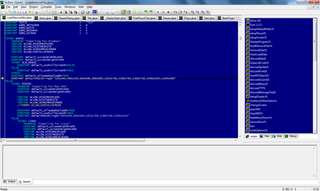
GLBasic is a commercial BASIC programming language that can compile to various platforms including Windows, Linux, Mac OS X, and some handheld devices. The language is designed to be simple and intuitive.
In computer programming and software development, debugging is the process of finding and resolving bugs within computer programs, software, or systems.

Bricx Command Center (BricxCC) is the integrated development environment (IDE) of Next Byte Codes (NBC), Not Quite C (NQC) and Not eXactly C (NXC). These programming languages are used to program the Robots in the Lego Mindstorms series. Not Quite C and Not eXactly C have a syntax like C. Bricx Command Center is currently limited to computers running the Microsoft Windows operating system. However, a version for the Linux operating system is currently in development. It is written by John Hansen.
Dexter Industries is a company that designs robots for education, research, and personal use. The company makes several products that expand the LEGO Mindstorms, Raspberry Pi and Arduino prototype system.

MIT App Inventor is a web application integrated development environment originally provided by Google, and now maintained by the Massachusetts Institute of Technology (MIT). It allows newcomers to computer programming to create application software (apps) for two operating systems (OS): Android and iOS, which, as of 20 January 2023, is in final beta testing. It is free and open-source software released under dual licensing: a Creative Commons Attribution ShareAlike 3.0 Unported license and an Apache License 2.0 for the source code.
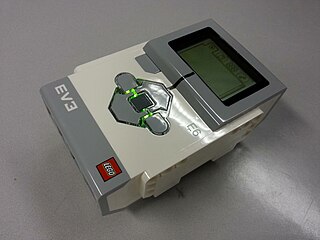
LEGO Mindstorms EV3 is the third generation robotics kit in LEGO's Mindstorms line. It is the successor to the second generation LEGO Mindstorms NXT kit. The "EV" designation refers to the "evolution" of the Mindstorms product line. "3" refers to the fact that it is the third generation of computer modules - first was the RCX and the second is the NXT. It was officially announced on January 4, 2013, and was released in stores on September 1, 2013. The education edition was released on August 1, 2013. There are many competitions using this set, including the FIRST LEGO League Challenge and the World Robot Olympiad, sponsored by LEGO.
Braigo is a Braille printer design. Braigo version 1.0 uses a Lego Mindstorms EV3 kit, which includes a microprocessor with assorted components such as electric motors, sensors and actuators. Braigo v1.0 was designed by 13-year-old Shubham Banerjee in January 2014, as an entry in 7th grade school science fair project. The model was based on the PLOTT3R, a bonus model released with the EV3 kit and originally designed by Ralph Hempel. The cost was said to be about 350 USD or 250 Euros for the Lego Mindstorms EV3 kit and some extra commonly used hardware whereas a conventional Braille printer retails starting from about US$1,900.
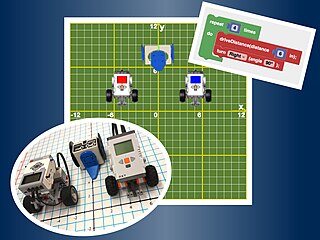
RoboBlockly is a web-based robot simulation environment for learning coding and math. Based on Blockly, it uses a simple puzzle-piece interface to program virtual Linkbot, Lego Mindstorms NXT and EV3, as well as to draw and animate for beginners to learn robotics, coding, math, science, and art. Blocks in RoboBlockly can be executed in debug mode step-by-step. All math activities in RoboBlockly are Common Core State Standards Mathematics compliant.
References
- ↑ "Update für NBC: Programmiersprache für Lego Mindstorms NXT". Archived from the original on 2007-05-21. Retrieved 2007-05-11.
- ↑ "Mindstorms Developer Program: John Hansen". Archived from the original on 2007-12-05. Retrieved 2007-05-11.
- ↑ NBC Debugger